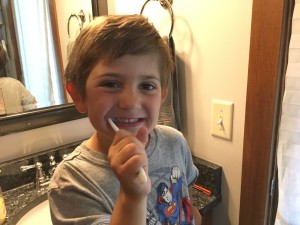By: Dr. Elizabeth Eggert
 By age two, your child should have a complete set of primary teeth that will stay put until the first tooth is lost, around age six. But well before then, around age four, your child’s jaw and facial bones start to develop to make room for the permanent teeth, which develop under the primary teeth. It’s important that your child has good oral health habits starting early in development so the primary and then permanent teeth are healthy and serve well into adulthood.
By age two, your child should have a complete set of primary teeth that will stay put until the first tooth is lost, around age six. But well before then, around age four, your child’s jaw and facial bones start to develop to make room for the permanent teeth, which develop under the primary teeth. It’s important that your child has good oral health habits starting early in development so the primary and then permanent teeth are healthy and serve well into adulthood.
Age Six to Age Eight
The tooth fairy usually makes her first visit to most households near the age of six. That’s when children lose their first primary teeth and the first permanent teeth appear. The permanent first molars erupt behind the primary teeth and are usually the first to come in, followed by the lower front teeth and upper front teeth. It’s completely normal for your child’s teeth to be different sizes, look uneven, and even appear missing. But don’t worry: by early adolescence, your child’s smile will come into place.
As permanent teeth appear, it’s important to continue the good oral health habits you started with your child’s primary teeth. The health of your child’s permanent teeth affects the ability to chew foods, speak, and smile. Encourage your child to avoid sugar and develop healthy eating habits to support his or her oral health.
Continue to brush and floss your child’s teeth until they are at least six years old. By age eight, most kids can brush their own teeth with supervision, but you should continue to floss your child’s teeth until they turn 10 or 11. Until these ages, children really don’t have the ability to fully clean all the teeth surfaces. Only use a pea-sized amount of toothpaste. Ask us for a recommendation for child-safe options.
Age Eight to Age Thirteen
Between ages eight and thirteen, your child’s permanent cuspids, bicuspids, and second molars will appear. As they do, we recommend sealants to protect teeth from cavities and tooth decay. Sealants are protective substances that we apply to your child’s teeth and is as easy as a regular dental checkup. The material bonds to your child’s teeth and fills in the pits and grooves that naturally appear on a tooth’s surface. This painless process can protect your child’s teeth for years before needing to be reapplied.
During this time, your child can take responsibility for more aspects of their health, including brushing, flossing, and making healthy eating choices. As more permanent teeth come in, it may become apparent that your child will need braces or other dental appliances to fix misaligned teeth or a bad bite. We can help you identify when and if these issues arise and will recommend an orthodontist.
If your kids are active in sports, it’s important to protect the permanent teeth from injury. A mouth guard protects teeth from being broken, knocked out, or from injuring your child’s lip or tongue during contact sports. There are many over-the-counter versions, but even better is to have us make a custom-fit mouth guard for your child.
Eggert Family Dentistry can help you and your child build good oral health habits that will keep the permanent teeth healthy well into adulthood. Schedule your child’s next dental recare visit with our dental team today.